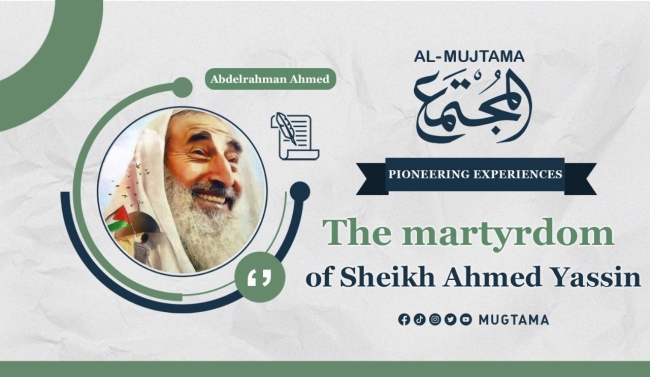The martyrdom of Sheikh Ahmed Yassin
The remains of an old man's wheelchair will remain a symbol of Israel's violations and its stripping of any divine values and earthly norms. It will also remain a symbol of the bitter and steadfast struggle of the Palestinian people against the aggressor, the murderer who, on March 22, 2004, sent warplanes to assassinate the body of the martyr Sheikh Ahmed Yassin. The missiles tore apart the slender body of the Sheikh with the first rays of dawn as he returned from the mosque to his home. However, the spark of jihad ignited by that Sheikh continued after him, as his disciples and colleagues took up the banner in his absence, pledging to avenge him.
Despite Sheikh Ahmed Yassin's complete paralysis since his youth, he was highly active in resisting occupation, and injustice, and alleviating the suffering of the Palestinian people and the end of occupation. He was a brilliant orator with the ability to convey his viewpoint, possessing the capability to mobilize and administer. His interests were not limited to the cause of his homeland, Palestine.
He participated in protests against the tripartite aggression on Egypt at the age of twenty, vigorously urging support for Iraqis to rid themselves of American occupation. He also did not forget his political work aiding Muslims in Afghanistan, the Philippines, and other Muslim countries.
He worked with the Muslim Brotherhood to provide aid to Palestinian refugees. With the outbreak of the first Palestinian uprising in 1987, known as the Intifada of Stones, the Sheikh worked with several of his colleagues to establish the Islamic Resistance Movement, Hamas.
He was arrested by Israeli occupation authorities several times, the last in 1989. In 1997, Mossad agents attempted to assassinate Hamas political bureau chief Khalid Mishal in Jordan using poison, but the Jordanian authorities managed to apprehend the Mossad agents who carried out the operation. The late King Hussein of Jordan insisted that the Mossad agents would only be released if Israel sent the poison used to assassinate Mishal and released Sheikh Ahmed Yassin, which they did.
The Sheikh returned to his hometown in the Gaza Strip and was received with the welcome of victors after becoming an icon of jihad and resistance to the occupier.
Sheikh Ahmed Yassin derived his status among Palestinians, Arabs, and the world from his steadfast commitment to the cause of his homeland and his people, focusing on Palestinian unity and refraining from brandishing Palestinian weapons except against the occupier.
The position Sheikh held in the hearts of the mujahideen unsettled Israeli authorities, and they did not realize what to do with a wheelchair-bound Sheikh who became a symbol for every resistor of injustice on the earth. So, they sent their missiles to punish him, unaware that they had fulfilled one of the Sheikh's greatest wishes: to join the ranks of the martyrs.


